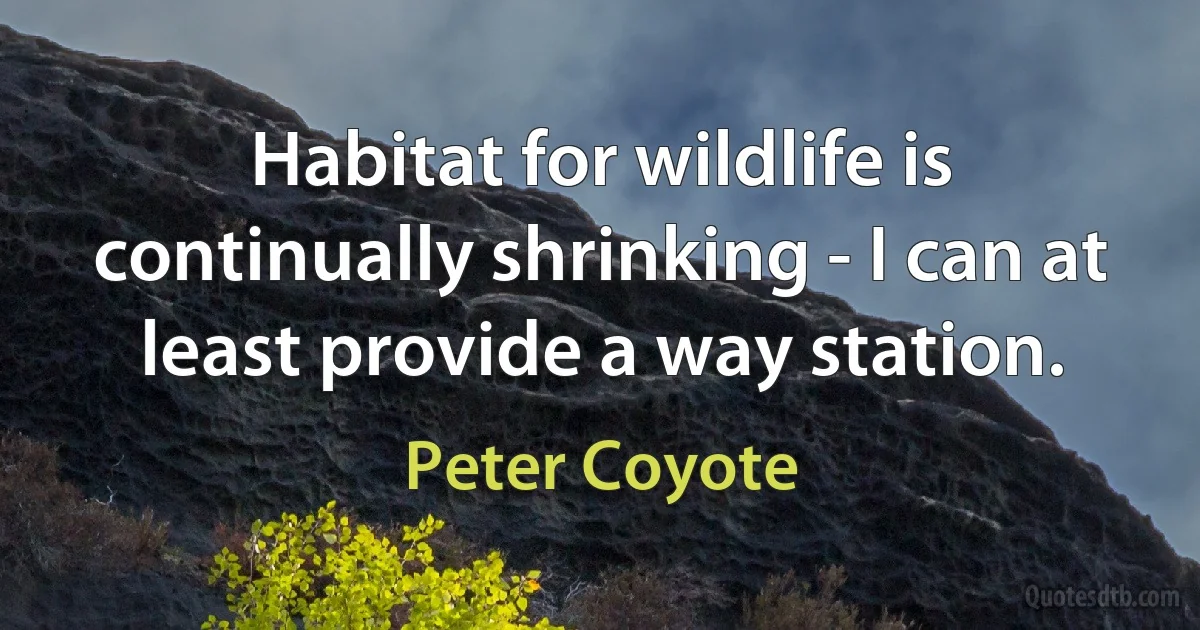Wildlife Quotes - page 2
In the early days our forefathers could cut down a forest or exhaust the fertility of a farm and then blithely move to a new forest or a new farm... The highest concept of statesmanship was to make it possible for the eager, aggressive pioneer to possess, to despoil and then repeat the process indefinitely. ...[Shortsided and unchecked greed resulted in] denuded forests, floods, droughts, a disappearing water table, erosion, a less stable and equable climate, a vanishing wildlife.

Harold L. Ickes
The Sea Shepherd Conservation Society is a conservative organization. I am a conservative. You can't get more conservative than being a conservationist. Our entire raison de etre is to conserve and protect. The radicals of the world are destroying our oceans and our forests, our wildlife and our freedom.

Paul Watson
Many years ago I used to read books like, for example, Ernest Thompson Seton's Lives of Game Animals to learn about animal behavior. But after a certain point, after living in the woods for a while, I developed an aversion to reading any scientific accounts. In some sense reading what the professional biologists said about wildlife ruined or contaminated it for me. What began to matter to me was the knowledge I acquired about wildlife through personal experience.

Theodore Kaczynski
In the fall, acorns, filberts, and hickory nuts are gathered by wildlife as winter stores. Field and pack rats bring in smaller seed such as wild rice from the marshes. If storages are provided, these foragers will fill hollow pipes or logs, or smaller pipes, old vehicle engine manifolds, and nest boxes or wall cavities. Seed so collected is sound, clean, and neatly stored. Providing some 15% is left, and given over to winter food for these workers, 85% can be collected for human use. A few people regularly collect their hickory nuts or wild rice in this way, by providing dens for squirrels or pack rats. It is a question of cooperation and provision for others, instead of attempting to kill off the experts and do the job yourself.

Bill Mollison
Once, when the bar was slow, he told her about things he'd found in his clients' pools. Alligators, for example; he'd encountered at least a dozen. Also the occasional snake. Hundreds of frogs. These were to be expected in South Florida, which as far as the native wildlife was concerned was still a swamp, no matter how many houses got built on it.

Dave Barry
I personally believed, at least in 1914 when predator control began, that there could not be too much horned game, and that the extirpation of predators was a reasonable price to pay for better big game hunting. Some of us have learned since the tragic error of such a view, and acknowledged our mistake. One must judge from the present volume that the Fish and Wildlife Service does not see any mistake.

Aldo Leopold
I'm not into animal rights. I'm only into animal welfare and health. I've been with the Morris Animal Foundation since the '70s. We're a health organization. We fund campaign health studies for dogs, cats, lizards and wildlife. I've worked with the L.A. Zoo for about the same length of time. I get my animal fixes!

Betty White
Contrary to what is sometimes claimed in the press, there are many fine historians in India. From my own generation of scholars, I can strongly recommend - to student and lay reader alike - the work of Upinder Singh on ancient India, of Nayanjot Lahiri on the history of archaeology, of Vijaya Ramaswamy on the bhakti movement, of Sanjay Subrahmanyam on the early history of European expansion, of Chetan Singh on the decline of the Mughal State, of Sumit Guha on the social history of Western India, of Seema Alavi on the social history of medicine, of Niraja Gopal Jayal on the history of citizenship, of Tirthankar Roy on the economic consequences of colonialism, of Mahesh Rangarajan on the history of forests and wildlife, and of A. R. Venkatachalapathy on South Indian cultural history.

Ramachandra Guha
The next time you dine on sushi -- or sashimi, or swordfish steak, or shrimp cocktail, whatever wildlife you happen to enjoy from the ocean -- think of the real cost. For every pound that goes to market, more than 10 pounds, even 100 pounds, may be thrown away as bycatch. This is the consequence of not knowing that there are limits to what we can take out of the sea.

Sylvia Earle



